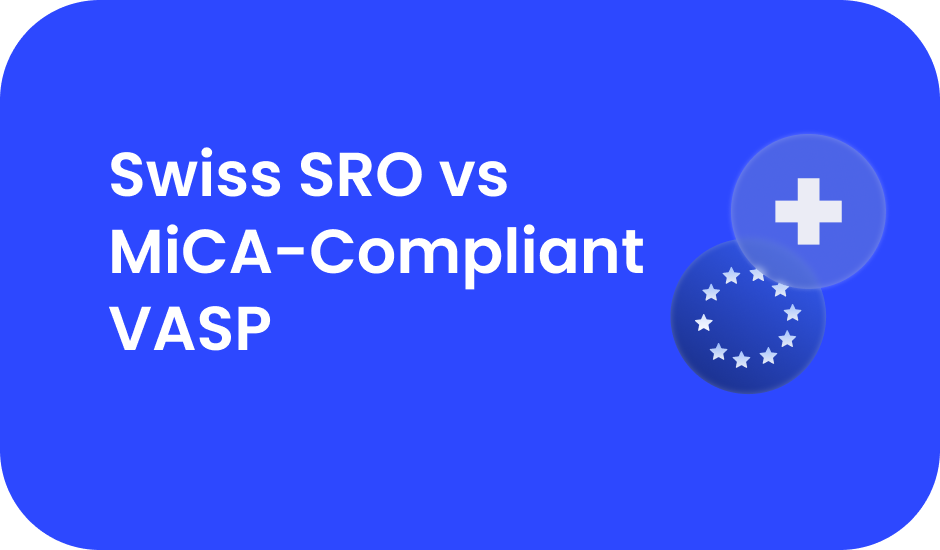In the first half of 2025, global crypto exchange trading volume reached $9.36 trillion, marking the strongest start to a year since 2021 (ffnews.com). Monthly volumes often surpassed $2.8 trillion, with institutional trading accounting for a significant share (coinlaw.io). Meanwhile, 90% of centralized crypto exchanges are fully KYC compliant in 2025, up from 85% in 2024 (coinlaw.io).
For crypto businesses navigating this competitive environment, the right licensing path can make or break market entry. Two prominent routes stand out: Swiss SRO membership and MiCA-compliant VASP licensing in the EU. Both bring legitimacy, but each serves different strategic goals.
For crypto businesses navigating this competitive environment, the right licensing path can make or break market entry. Two prominent routes stand out: Swiss SRO membership and MiCA-compliant VASP licensing in the EU. Both bring legitimacy, but each serves different strategic goals.
Understanding Swiss SRO Membership
Under the Swiss Anti-Money Laundering Act (AMLA), crypto businesses must adhere to AML/KYC standards. One of the fastest ways to achieve compliance is by joining a FINMA-approved Self-Regulatory Organization (SRO) such as VQF, ARIF, or PolyReg.
Key facts about Swiss SROs:
Key facts about Swiss SROs:
- Legal status: Confirms AML/KYC compliance but is not a full financial license.
- Approval time: Usually 1–3 months, enabling rapid operational launch.
- Scope: Allows global activity (subject to local laws), with periodic audits by the SRO.
Advantages — Why Swiss SRO Can Be the Smartest First Step for Your Crypto Business
- Fastest Path to Regulated Status: Most applications are approved within 1–3 months, letting you start onboarding clients while competitors wait for lengthy licensing approvals.
- Lower Capital and Compliance Costs: No large capital reserves are required. Annual compliance and audit costs remain predictable.
- Prestige of Swiss Jurisdiction: Swiss AML/KYC oversight carries global trust, helping attract banks, investors, and corporate partners.
- Operational Flexibility: Ability to serve clients in multiple countries without being tied to a single market.
- Versatile Business Model Support: Suitable for exchanges, OTC desks, crypto payment providers, token projects, and select DeFi services.
Stepping Stone to Larger Licenses: Many use Swiss SRO as a launchpad before pursuing MiCA VASP, EMI, or other licenses — reducing market entry time and spreading costs.
Limitations — and How They Can Work in Your Favor
- EU Market Access with Flexibility: Enables operations in the EU by meeting specific local registration or partnership requirements, without committing to the full MiCA licensing process from the start.
Advantage: Allows you to start engaging with EU clients and partners early, while keeping initial costs and compliance obligations lower.
- AML/KYC-Focused Regulation: Limited to anti-money laundering and customer verification obligations.
Advantage: Allows startups to focus compliance efforts on core essentials while refining their product.
- Mandatory Compliance Audits: Regular operational reviews are required.
Advantage: These strengthen trust with banks and partners, improving your ability to secure funding and payment integrations.
What You Can / Can’t Do with Swiss SRO
MiCA-Compliant VASP Licensing — Your Gateway to the EU
The Markets in Crypto-Assets Regulation (MiCA), in force since 2023, sets a unified crypto framework across EU member states. A MiCA VASP license grants passporting rights — once licensed in one EU country, you can operate across all 27.
Key features:
Key features:
- Regulated by a national financial authority (e.g., BaFin in Germany, AMF in France).
- Covers AML/KYC plus investor protection and operational standards.
- Application time: 6–12 months depending on business complexity.
- Designed for businesses prioritizing EU retail and institutional markets.
Swiss SRO vs MiCA VASP — Side-by-Side
Cost & Timeline Comparison
ROI Scenario — Swiss SRO vs MiCA VASP
When Swiss SRO Makes Sense
- You need fast market entry without heavy capital requirements.
- Your main audience is global, not exclusively EU.
- You want to build compliance credibility before scaling.
When MiCA VASP Is the Better Fit
- Your core market is the EU and EEA.
- You aim to work with institutional investors.
- You can commit to a longer, more expensive licensing process.
The Hybrid Strategy — Start Swiss, Expand EU
Many businesses start with Swiss SRO to gain regulated status quickly, then apply for MiCA VASP for EU expansion. This phased approach spreads costs, manages regulatory risks, and builds a trusted track record.
BMP Global supports crypto companies in choosing and securing the right license. Whether you’re going to Swiss SRO, MiCA VASP, or both, we manage the process from initial consultation to final approval.
Explore our licensing services and take the first step toward regulated growth.
BMP Global supports crypto companies in choosing and securing the right license. Whether you’re going to Swiss SRO, MiCA VASP, or both, we manage the process from initial consultation to final approval.
Explore our licensing services and take the first step toward regulated growth.
Book a meeting with BMP Global - https://bmpglobal.io/book-meeting













